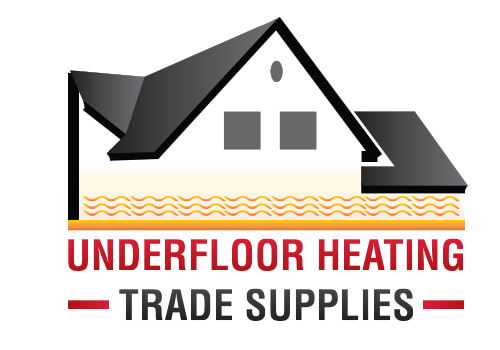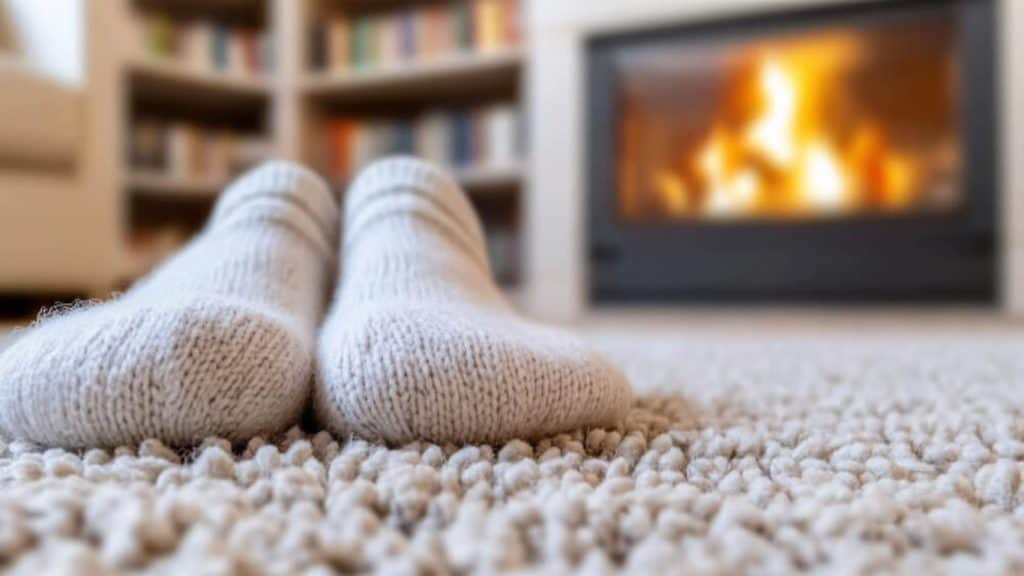
Ever wondered if your cosy carpet can coexist with underfloor heating? Let’s dispel the myths and lay out the facts on whether does underfloor heating work with carpets.
Underfloor heating systems are an efficient way to warm your home without compromising on style. Homeowners sometimes wonder whether this form of radiant floor heating can work with different floor types. One of the most common floor types in the UK is carpet, both new build and old homes, but can underfloor heating work with carpet? In this article, we will explore whether carpets and underfloor heating can work together effectively. From tog ratings to the best types of carpets for heat efficiency, we cover all you need to know to make an informed decision.
Key points:
- Benefits of pairing carpets with underfloor heating.
- Importance of selecting the right carpet tog ratings.
- Suitable carpet types for optimal heat transfer.
- Installation tips for maximising underfloor heating efficiency.
- Safety considerations and maintenance advice.
You can also check out our guide on the best flooring for underfloor heating as we underline the pros of each popular floor network.
- Does Underfloor Heating Work with Carpet?
- Benefits of Carpet on Underfloor Heating
- Choosing the Right Carpet for Underfloor Heating
- Understanding Carpet Tog Ratings for Underfloor Heating
- Installation Considerations for Carpets on Underfloor Heating
- Selecting the Right Underlay for Underfloor Heating
- Best Carpet Types for Underfloor Heating
- Installation Tips for Carpet Over Underfloor Heating
- Managing Heat Output with Thermostats
- Is it Safe to Use Carpet with Underfloor Heating?
- What to Avoid After Installation
- Choose Underfloor Heating with Carpets
- FAQs
- Sources
Does Underfloor Heating Work with Carpet?
In simple terms, yes, underfloor heating can effectively work with carpet, and there are several compelling reasons to consider this combination.
Carpet, with its inherent warmth and comfort underfoot, aids the functionality of underfloor heating systems by providing an even, gentle warmth that radiates throughout your living space. Unlike traditional radiators that circulate hot air, underfloor heating paired with carpet heats the room from the ground up, creating a uniformly warm environment without stirring up allergens or dust.
Can underfloor heating and radiators work together? Find out now.
Benefits of Carpet on Underfloor Heating
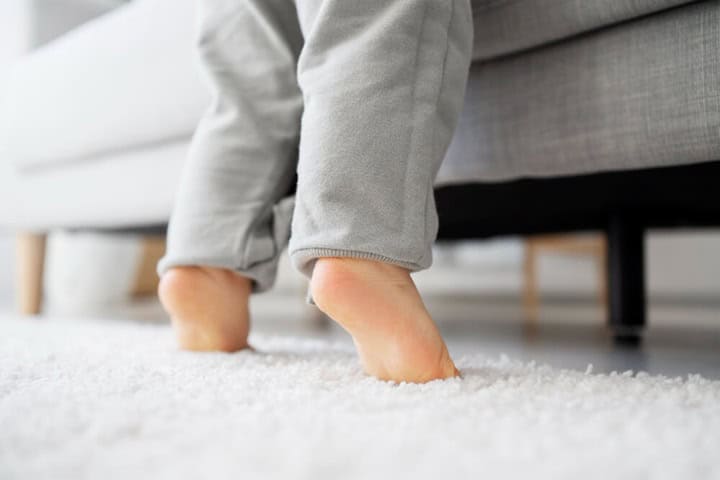
The soft texture of traditional carpet surfaces not only adds a layer of comfort underfoot but also contributes to the overall warmth of the room. This setup is particularly beneficial in bedrooms and living areas where cosiness is most needed.
The warmth is distributed evenly, eliminating cold spots that are often experienced with other types of flooring. Additionally, because underfloor heating does not rely on air circulation, it minimises the movement of dust and allergens within the room. This makes it an excellent choice for those with allergies, providing a cleaner, healthier living environment.
Choosing the Right Carpet for Underfloor Heating
Not all carpets are suitable for underfloor heating, and selecting the right type can significantly impact the system’s efficiency.
Carpets that are too thick or have insulating backings, like rubber, can affect the heat flow, making the system less effective. Instead, opt for carpets with hessian backing, which allows heat to permeate more freely, ensuring your room reaches and maintains the desired temperature.
The thickness of the carpet also plays a pivotal role towards heat distribution. Thicker carpets might feel luxurious but can act as an insulator above your heating system, trapping the heat below rather than allowing it to warm the room. Therefore, it’s necessary to consider the carpet’s tog rating—the measure of thermal resistance.
Understanding Carpet Tog Ratings for Underfloor Heating
A carpet’s tog rating, combined with the tog rating of the underlay, should not exceed 2.5 to ensure the best heating efficiency. For systems equipped with a heat pump, the combined tog value should ideally be less than 1.5. This ensures that the underfloor heating system operates efficiently without being hindered by excessive insulation.
For example, a standard 80% wool and 20% nylon mix carpet typically has a tog value of around 1.23, which is ideal. However, the thickest wool carpets can exceed a tog rating of 2.5 and may not be suitable without adjustments or specific advice from heating experts.
Installation Considerations for Carpets on Underfloor Heating
When installing carpet over underfloor heating, it is vital to ensure that both the carpet and the underlay are compatible with the heating system. This compatibility includes checking that the combined tog ratings do not exceed the recommended maximum and that the flooring installation allows for effective heat transfer.
| Interfloor Underlays | Thickness | Tog Rating |
| Technics 5 | 5.00m | 0.56 |
| Technics 6 | 6.00mm | 0.66 |
| Willow Green waffle rubber | 8.4mm | 1.1 |
Selecting the Right Underlay for Underfloor Heating
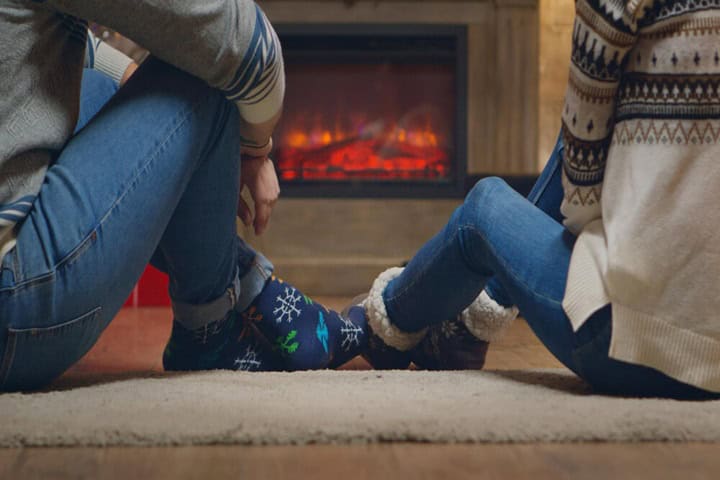
When considering underfloor heating, the type of underlay you select is just as crucial as the carpet itself. A well performing underlay can aid the functionality of your underfloor heating system while providing additional comfort and durability.
Here are some guidelines of do’s and don’ts to ensure you select the best underlay for your underfloor heating system:
Do:
- Choose a thin underlay with a tog rating less than 2.5 when combined with your carpet to ensure maximum heat transfer.
- Opt for underlays with good insulation and noise reduction qualities that do not compromise the heat output of your underfloor heating system.
Don’t:
- Don’t go for a thick underlay as it may hinder the heat flow from your underfloor heating system, making it less efficient.
- Manufacturers like Interfloor, known for their Tredaire and Duralay brands, often recommend specific products like Heatflow, designed to work well with underfloor heating due to their lower tog values and effective heat conductivity.
Best Carpet Types for Underfloor Heating
When installing underfloor heating, not all carpet types are suitable. Here’s how to choose the best carpets for your system:
- Nylon Carpets: These are generally ideal for underfloor heating. For example, Brintons Bell Twist, with a tog rating of 1.23, ensures efficient heat transfer while maintaining the comfort and elegance of your home’s interior.
- Wool Carpets: While luxurious and thick, wool carpets typically have higher tog ratings, which might restrict the heat flow from your underfloor heating, making them less ideal unless specifically designed for such systems.
Installation Tips for Carpet Over Underfloor Heating
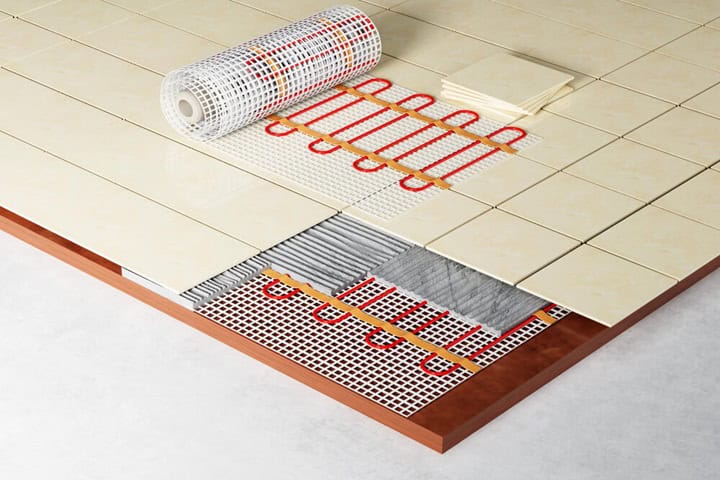
Installing carpet over underfloor heating requires careful consideration to ensure effectiveness and safety:
- Check Tog Ratings: Always ensure that the combined tog rating of the carpet and underlay does not exceed 2.5 to maintain efficient heat transfer.
- Prepare the Subfloor: The subfloor should be dry and structurally sound. Clean it thoroughly to remove any paint, debris, or dust, and ensure any used chemicals are compatible with the underlay and carpet.
- Account for Surface Irregularities: If laying over an uneven floor, consider using plywood to create a smooth base.
Managing Heat Output with Thermostats
To effectively manage the warmth in your carpeted rooms, using a thermostat is essential:
- Thermostat Options: There are various thermostats available, from simple dial types to advanced smart thermostats, allowing for precise temperature control.
- Room Requirements: Carpeted rooms often retain more warmth, which may allow you to set your underfloor heating at a lower temperature compared to rooms with harder flooring.
Using a thermostat not only helps in maintaining a comfortable environment but also ensures that the maximum floor temperature—typically set around 27 degrees Celsius—does not exceed safety limits, thus protecting your flooring and ensuring efficient operation of your underfloor heating system.
Is it Safe to Use Carpet with Underfloor Heating?
Yes, using underfloor heating with carpet is completely safe, provided the installation is handled by professionals. Contact our team of experts and see how we can help. Our underfloor heating solutions are tailored to each home, ensuring they meet your specific needs safely and effectively. We collaborate with certified installers who guide you through every step, from selection to installation, to ensure optimal safety and functionality.
What to Avoid After Installation
Once your underfloor heating system and carpet are installed, certain precautions should be taken to maintain efficiency and prolong the life of both your heating system and carpet. Whilst we covered some of these in our ‘do’s and don’ts section, some need to be reiterated to understand the bigger picture:
- Avoid Heavy Coverings: Do not place heavy rugs or furniture with a high tog rating directly over heated areas. These can obstruct heat flow, known as ‘thermal blocking’, potentially causing damage through overheating.
- Monitor Heat Settings: It is crucial to control the temperature settings accurately. Overheating not only risks damaging your carpet but can also degrade the heating system itself. We recommend setting your underfloor heating to maintain a temperature between 25 degrees Celsius and 27 degrees Celsius when active, and lowering it to 16-18 degrees Celsius when less heat is needed. A programmable thermostat can automate these adjustments, making it simple to align your heating needs with your daily routine.
Choose Underfloor Heating with Carpets
In conclusion, it is clear that underfloor heating can be a superb addition to any home with carpeting, offering an even, efficient heat distribution that ads comfort without compromising safety. When paired with the right carpet and underlay, it proves not only efficient but also hygienic, reducing allergens and dust circulation. Ensuring the installation is professionally handled and following specific guidelines for furniture placement and temperature control can help maximise both the system’s performance and its lifespan. Whether you’re renovating or just looking to improve your home’s heating, underfloor heating with carpet is a safe, effective choice that delivers warmth and comfort stylishly and sustainably.
Here are the top carpet mistakes to avoid to ensure your flooring is perfect.
Further reading:
Based on what has been discussed in this article, here is some additional reading that may benefit you and your underfloor heating solutions
- Heat and asthma: discover how underfloor heating aids those with dust allergies and helps in getting rid of those pesky dust mites.
- Ground source heat pumps with underfloor heating: find out how these two systems can be integrated together.
FAQs
How long does it take for heat to pass through carpet when using underfloor heating?
The time it takes for heat to pass through a carpet depends on the carpet’s thickness and thermal resistance. Generally, it may take longer for the heat to permeate through thicker carpets compared to thinner ones.
What type of carpet works best with underfloor heating?
Carpets with lower tog values and denser, thinner fabrics generally work better with underfloor heating, as they allow more heat to pass through into the room.
Sources
Slack, M., (2022) Carpet mistakes to avoid – 5 expert-approved tips to ensure perfect flooring. Homes & Gardens. [online] Available at: https://www.homesandgardens.com/interior-design/carpet-mistakes-to-avoid [accessed 12/11/2024]
